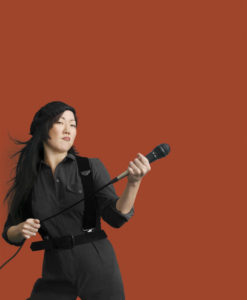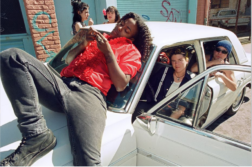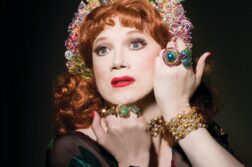“Well-behaved women rarely make history,” observed Harvard professor Laurel Thatcher Ulrich. Margaret Cho is not a well-behaved woman.
Cho is best known as a stand-up comedian who’s been a trailblazer in breaking down repressive taboos and exposing hypocrisy. In fact, she’s been doing just that in an amazing number of genres. Her concert film, I’m The One I That I Want, based on her one-woman Off-Broadway show, broke an industry record by grossing the most per print of any movie in history. She also wrote a best-selling book of the same name. This was followed by the “Notorious C.H.O.” tour in 2001, which culminated in a sold-out concert at Carnegie Hall. This tour was also recorded and released as a feature film. In 2003 Cho embarked on her third sold-out national tour, “Revolution,” the CD for which was nominated for a Grammy in the best comedy album category for 2003. Running through all her work is a commitment to fight homophobia, sexism, racism, social inequality and other injustices.
 Born in 1968 in San Francisco, Cho knew she wanted to be a comedian by age fifteen and started doing it a year later. Although her father, Seung Hoon Cho, wrote jokes, comedy was looked down upon in Korean culture, especially as a pursuit for Korean women. By the time she was in her early twenties, she was hitting the college circuit, where she became the most booked act in the market and garnered a nomination for Campus Comedian of the Year. Arsenio Hall introduced her to late-night TV audiences, and Bob Hope (of all people) put her on a prime time special.
Born in 1968 in San Francisco, Cho knew she wanted to be a comedian by age fifteen and started doing it a year later. Although her father, Seung Hoon Cho, wrote jokes, comedy was looked down upon in Korean culture, especially as a pursuit for Korean women. By the time she was in her early twenties, she was hitting the college circuit, where she became the most booked act in the market and garnered a nomination for Campus Comedian of the Year. Arsenio Hall introduced her to late-night TV audiences, and Bob Hope (of all people) put her on a prime time special.
In 1994, Cho starred in a short-lived ABC sitcom called All-American Girl. A dozen years later she’s set to return to television on a show Fox is developing in which Cho will get to play a character resembling her mother, whom she adores. In the meantime, she’s recently come off her fourth national tour, “Assassin,” and published a new book, I Have Chosen to Stay and Fight. Her most political and topical work to date, “Assassin” toured the U.S., Canada, and Australia and was filmed at the Warner Theatre in Washington, D.C. Equally trenchant politically, if not as humorous, is her new book, a collection of essays addressing topics ranging from large social issues to her own issues with weight, race, and marriage.
Cho has also completed her first narrative feature film, the funny if flawed Bam Bam and Celeste. Directed by Lorene Machado and written by and starring Cho, the film, due out in March of this year, is the story about a young woman (Margaret) becoming comfortable with her body while battling homophobia, racism, and small-town narrow-mindedness.
For this exclusive interview, I spoke with Cho in her new adopted hometown of Glendale, California.
— John Esther
Gay & Lesbian Review: Your gay-friendly attitude is often at the forefront of people’s consciousness when they talk about you. Some are shocked a non-gay could be such a gay advocate.
Margaret Cho: It’s weird to consider myself a non-gay because I am so within the gay community. I would never think of myself as heterosexual. I would never think of myself as a straight person. So it doesn’t make sense to define myself as that in the first place. Even though I am married [to Reverend Al Ridenour]and I have this kind of conventional life, there is a big part of me that is very queer in my politics and very queer in my sensibilities.
G&LR: What do you think about the categorizations of straight, bisexual, and gay?
MC: I think it is needed to an extent because people need to define themselves. Yet there are certain individuals that go beyond gender, that are living their lives beyond labels and beyond all these ideas we have about sexuality, and I consider myself one of those people.
G&LR: Do you think the same-sex marriage ordeal is the most important domestic issue of our time?
MC: It’s one of them. It’s certainly goes down under the heading: “Equality for Everybody.” That’s what I want most of all and when we’re talking about same sex marriage we should talk the same way about fighting the overwhelming poverty in our nation. There is such a disparity in rights, money, and all of these things; and to equalize everything is the most important issue we all face.
G&LR: You say being gay is not a choice? If so, when does free will come into play with regard to picking mates or, for that matter, is there any free will in any of the choices we make?
MC: You can still be gay and live a life as a heterosexual person, but you won’t be happy. We have to follow who we are as much as we can to attain peace. You can choose not to be who you are, but then it’s a very painful way. Why would anybody want to do that?
G&LR: Yes, but where does determination end and free will begin?
MC: I don’t know. Who knows? You know, there are these camps where they try to make people heterosexual through Christ. You can’t really change who you are.
G&LR: What do you think about the institution of marriage?
MC: It’s really a great thing. It’s been really wonderful for me. I’m happy in my marriage and it should be available to everybody because it’s a great, divine, wonderful thing. To limit the rights of certain Americans because of their sexuality is so shocking to me and terrible.
G&LR: What does it say about America when an Ann Coulter (“Cunta Kinte,” as you call her)—an aging, mini-skirt wearing, childless, unmarried, working, city woman—is not perceived as a threat to American values, but you are: a married woman living in the suburbs of Glendale who struggles for civil rights, equality, marriage, the separation of church and state, love and honor for all Americans? Yet you are perceived as a threat to the status quo and Coulter is not!
MC: It’s typical. She’s trying to maintain the status quo, resist change and any of the things I’m trying to fight for. I’m looking for change, and to create social change and harmony. To me it’s a typical situation. It doesn’t really irk me. There are a lot of people who consider her a threat and consider me as something as positive. There are so many different opinions. But I love being “dangerous.”
G&LR: In the film and book there is the presence of limousines. What do you say to those who would accuse you of being a “limousine liberal”?
MC: It’s very wrong to have a limousine. I usually walk. Limousines are like the most gas-guzzling things ever.
G&LR: You seem to be more forgiving when it comes to pop stars than politicians.
MC: Yeah, because politicians don’t create anything I like. Even if an artist has a different perspective, if I like what he or she is doing artistically, I have to say I can’t dismiss them altogether. But politicians are all about their opinions and playing the game.
G&LR: There is a lot of self-deprecating material in the book, and you claim not to have all the answers, and yet a lot of your material success is based on people wanting to know your opinion. Why do you think people should and do listen to you?
MC: Because I entitle myself to having an opinion and I’m unafraid to comment on things that many people would be. When people ask me for my opinion, a lot of it is them asking if it is okay for them to have an opinion. People find it extraordinary. It’s very hard to speak your mind when you feel you are not counted in the whole dominant culture.
G&LR: Is there anything good you can say about President Bush?
MC: He really has some brilliant people working for him. I would love to have his publicist and Karl Rove. Their tactics are pretty ingenious. Everything has been calculated so beautifully, and even though I don’t agree with Bush, I have to be taken aback and, in a sense, almost applaud it. I wish liberals had that kind of spin on everything.
G&LR: You talk a lot about violence in your “Assassin” tour and in the new book. When is violence is an acceptable option?
MC: I think violence is an acceptable option if it’s me punching someone out because I feel like I’m being victimized. I think women should be able to kick anybody’s ass that they want to. I sometimes feel so angry about things that violence is the only option for me in self-defense and maintaining myself, keeping myself whole. That should be absolutely justified.
G&LR: You say a lot of disturbing things some mean people out there might not take too kindly to. Do you ever fear for your life?
MC: Yeah, I suppose. I also think it would be very glamorous if I was assassinated. It would be really hot. It would be really cute. I would be immortalized. If was I were hurt, it would take all the things I said and shoot them up to this stratosphere. Sometimes I fear violence and then I think, “You know, it would really help my cause.”




